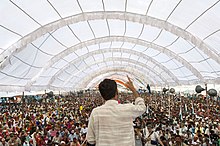Rajagopal PV
Rajagopal PV (* 1948 as Rajagopal Puthan Veetil in Thillenkery , India ) is an Indian non-violence activist who succeeded Gandhi . He is the founder and president of Ekta Parishad and vice president of the Gandhi Peace Foundation in New Delhi .
Life
Rajagopal was born in 1948 as the fourth of five children in Thillenkery, a village in the state of Kerala . His father was a "freedom fighter" for the independence of India , and therefore often separated from his family. Rajagopal received elementary education in Seva Mandir in the Malayalam language . She followed Gandhi's philosophy (living and working in a community). He then studied classical dance and classical music before earning an agricultural engineering degree in 1969 at Sevagram , Gandhi's Ashram in Maharashtra . There he also learned the English language .
On the Gandhi Express train , which traveled through India for a year in 1969 on the occasion of Gandhi's hundredth birthday, he was approached by numerous young people. This was the impetus that he practically began to engage in non-violent struggle.
Rajagopal only uses his first name in public in order not to be labeled based on his origin from a certain caste . Since 1993 he has been married to Jill Carr-Harris, a Canadian who is also committed to social change .
His activism
From 1970 to 1978, Rajagopal lived in an ashram in Joura, a town near Gwalior ( Madhya Pradesh ), a region that suffered from banditism . The Gandhi activists managed, step by step, to come into contact with the groups responsible for the attacks. They achieved that many of these "Dacoits" voluntarily lay down their weapons in front of a statue of Mahatma Gandhi. These men were jailed for 15, 20 or even 25 years. Meanwhile, the Gandhi activists helped the prisoners and their families. Then Rajagopal spent a year in Nagaland , where there were conflicts between the Indian army and underground fighters, and a year in Orissa with the indigenous people, the Adivasi .
In 1980 Rajagopal returned to what is now the state of Chhattisgarh . His experience has shown him that his struggles against physical violence would be inadequate as long as there was poverty, injustice, corruption and misery. He campaigned against structural violence by calling on large numbers of young people to nonviolently fight exploitation and poverty in the villages. Those who benefit from this system therefore turned against him:
“ Everyone was against me because I raised questions like: Why isn't the land being redistributed? Why are there work slaves in the country? Why is there so much corruption in government offices? Why do politicians shirk their responsibility? "
At that time he was appointed by the Supreme Court to investigate the problem of the enslaved workers. His nomination took place within the framework of the 1976 "Bonded Labor System (Abolition) Act". The power that gave him this role enabled him to work between 1985 and 1990 for the rehabilitation of thousands of people who worked in stone mines or dam construction sites in Trichy , Erode and Salem in the state of Tamil Nadu . Rajagopal expanded his activities to several states and regions, founded individual organizations and finally in 1991 the umbrella organization Ekta Parishad , of which he is still president. At the Gandhi Peace Foundation he became secretary and president of the Committee for the National Campaign of Rural Workers.
Ekta Parishad especially helps landless farmers to better control the resources that enable them to survive: the soil, the water and the forest. At a meeting with Prime Minister Manmohan Singh on December 24, 2005, Rajagopal expressed his movement's demands:
“ Create a national authority for the country, which has the possibility to intervene in disputes and problems around the country and which can make decisions. "
.
The “ Janadesh 2007 ” campaign, which included a march of landless Dalits and Adivasi from Gwalior to Delhi , essentially pursued this goal. In October 2012, Rajagopal and Ekta Parishad undertook a new march, the “March of Justice” (“Jan Satyagraha”) from Gwalior to Delhi.
Rajagopal is a member of the Support Committee for the Russell Tribunal on Palestine , which began its work on March 4, 2009.
Individual evidence
- ^ A b Rajagopal PV, Founder & President of Ekta Parishad , Interview by John Hogan, published in the Australian magazine Ahimsa - Nonviolence (IGINP), vol. II, # 1/2006.
- ↑ Bonded Labor System (Abolition) Act, 1976 ( Memento of the original from December 14, 2010 in the Internet Archive ) Info: The archive link was automatically inserted and not yet checked. Please check the original and archive link according to the instructions and then remove this notice.
Web links
- Interview with Rajagopal PV , WOZ Die Wochenzeitung , January 30, 2014.
- Peace activist Rajagopal: Every Step a Spiritual Action , SRF , January 26, 2014.
| personal data | |
|---|---|
| SURNAME | Rajagopal, PV |
| ALTERNATIVE NAMES | Rajagopal, Puthan Veetil (maiden name) |
| BRIEF DESCRIPTION | Indian non-violence activist who succeeded Gandhi |
| DATE OF BIRTH | 1948 |
| PLACE OF BIRTH | Thillenkery , India |


